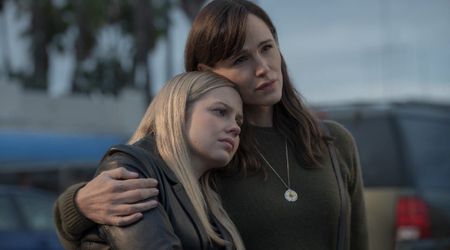'Trial 4': Who is Rachael Rollins? Boston's first woman of color DA wants to change the criminal justice system

Netflix's new limited docuseries, 'Trial 4' focuses on the story of a man who says he was wrongly convicted of murdering a police officer when he was just 19 years old. The eight-part docuseries will feature Sean Ellis as he faces his fourth trial — 25 years after he was first tried in 1995 — as he may end up going back to prison. Ellis had been previously sentenced to life and was released when new evidence came to light.
The docuseries tells the story of Sean K Ellis, who has spent 22 years in prison after being convicted of the 1993 murder of Boston police detective, John Mulligan. Ellis was put on trial three times within the space of a year, and now faces his fourth trial – which could see him back in prison for life. After his first three trials for armed robbery and first-degree murder, Ellis, aged 19 at the time, was found guilty in 1995 and sentenced to life. His first two trials resulted in a hung jury. In 2015, Ellis was freed from jail on bail, after a judge ordered a new trial saying evidence about how the case had been handled had been withheld from the defense. Ellis, who has always maintained his innocence, faced his fourth trial in 2018.
One of the reasons that Ellis was perhaps able to get justice was because of Suffolk County's (which encompasses) new District Attorney, Rachael Rollins. Rollins, who is the eldest of five children in a biracial family won the position in a landslide victory and immediately made it clear that she wanted to clean up Boston's criminal justice system, which was known for its racist tendencies. Rollins became Suffolk County's first Black woman as the District Attorney. One of her first plans -- which was deemed controversial -- as DA was not to prosecute certain crimes, including trespassing, shoplifting, larceny under $250, receiving stolen property, and drug possession with intent to distribute: she wanted prison only as a "last resort."
After graduating from Georgetown University in 1999, Rollins worked as a Field Attorney at the National Labor Relations Board in Boston. There, she conducted elections, acted as a hearing officer, investigated unfair labor practices, and prosecuted violations of the National Labor Relations Act. She also fought for the rights of workers, many of them poor, undocumented, people of color. In 2007, she joined the United States Attorney’s Office in Massachusetts as an Assistant United States Attorney. As an AUSA, she prosecuted and defended a variety of cases ranging from fraud to employment discrimination, from forfeiture to sexual violence and child abuse, from gun trafficking and narcotics cases to assisting with public integrity matters.
After taking the office of the DA, she hired a data scientist to analyze past performance and measure the impact of new policies. In what is thought to be a first in the country, she named an external committee to review officer-involved fatal shootings instead of letting prosecutors, who work with police on a daily basis, investigate these events. She is also working to expand programs that use alternatives to criminal prosecution and vowed to make solving the 1,000 cold-case murders in Suffolk County a priority.
The appointment of Rollins as Suffolk County's new District Attorney gave Ellis and his attorney, Rosemary Scapicchio renewed hope for his case. For Rollins, the stakes were high -- if she sided with Ellis's defense team, she would be branded as someone who let a "cop killer" walk free, as many were still unconvinced of Ellis's innocence. When the charges against Ellis were dropped, Rollins said that she would not second-guess the decision. However, she noted that she would not rule out taking a second look at his case, saying, "I am going to be looking at every single thing that our office has done if there are open matters. I am going to make sure that we’re looking at everything with a fresh set of eyes and if we believe that mistakes were made on our part, or with respect to our partners in law enforcement, we’ll be talking about those as well."
'Trial 4' is now streaming on Netflix.










